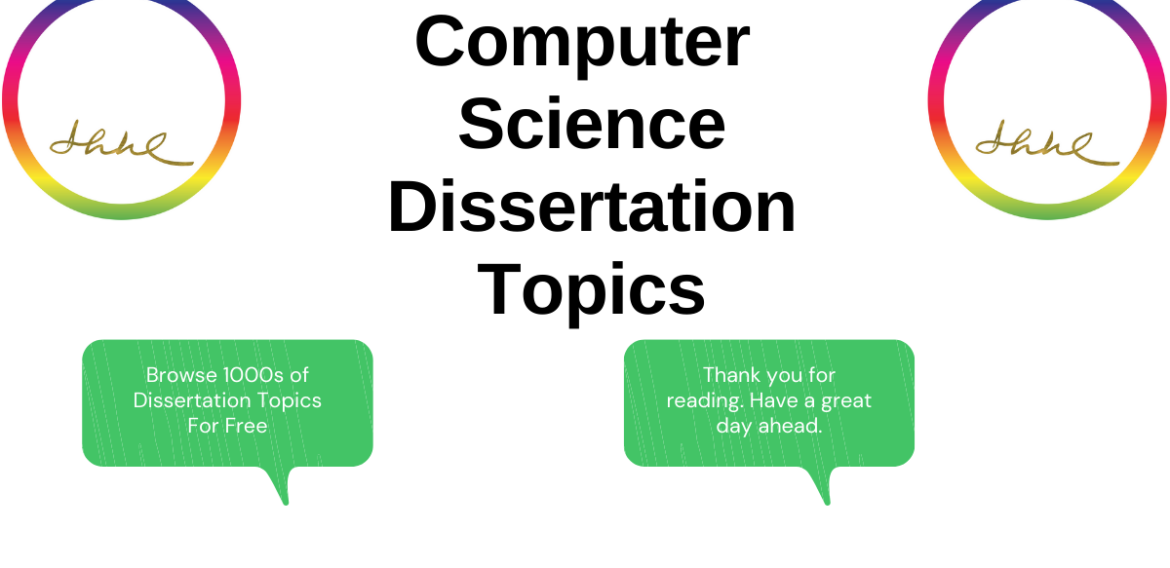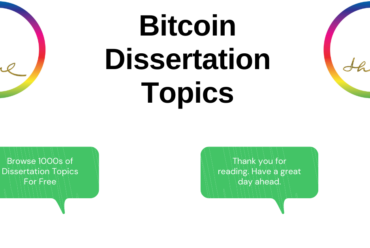Computer Science Dissertation Topics
Dissertations are one of the most significant types of academic work that students accomplish during their time in college since they allow you to work independently on an issue that interests you. Choosing what to do with your leisure time is more challenging than answering essay problems or studying assigned topics. There are numerous computer dissertation themes available, therefore we’ve compiled a selection of unique ones to get you started.
Editingarsenal has compiled a list of some of the most popular and common dissertation topics from a variety of academic disciplines, so you can pick and choose what to write about. If you need dissertation editing assistance , don’t hesitate to contact one of our qualified and experienced editors and proofreaders.
Computer Science Topics
- Generally speaking, the word “computer science” refers to the study of computers and technical systems. This term encompasses both theory and practise of information technology (IT). Computer scientists, as opposed to computer or electrical engineers, are concerned with software, application evaluation, and programming languages. Computer Science majors include project management, artificial intelligence, computer networks or systems, security, information systems, and virtualization of computer interfaces. Dissertation topics in this field include the following:
- An analysis of the various methods and algorithms for parsing and indexing multimedia databases.
- How can text classification visualise complex hierarchical structures and machine learning?
- What are the various tools and methodologies for analysing software requirements available in the United Kingdom?
- The capacity to navigate independently in both indoor and outdoor environments.
- How may information technology (IT) contribute to the enhancement of the value of interorganizational knowledge sharing?
- Advertising and Marketing using Artificial Intelligence: Using AI principles and approaches in advertising and marketing.
- Creating a virtual environment model with the assistance of an autonomous mobility robot.
- How can the cybersecurity risks associated with the introduction of self-driving automobiles in the United Kingdom be better understood?
- How to determine the optimal technique for testing distributed systems successfully at the system level.
- Analyze and create requirements for a Next-Generation Software Release Management System (NGSRMS).
- How do you develop a cloud-based information system for an oil storage corporation using Internet technologies?
- How can a software development company determine the Enterprise Content Management System requirements?
- In what ways is the process of developing information systems influenced by numerous underlying factors?
- As part of the investigation of ‘agile project management methodologies,’ risk management evaluation and project management tools that include risk analysis into project management practises are being examined.
- How can risk approaches be used successfully during the software development process to avoid failed implementations?
- What are the current concerns and challenges faced by database design and development professionals?
- Enhance healthcare delivery by efficiently utilising bioinformatics.
Information Management Systems Topics
- An information system is a group of people, data, and activities that work collaboratively to process data and information within a business. This category encompasses both manual and automated processes within the organisation. Additionally, HCI, or human-computer interaction, can be added. Computer-based data processing systems are comprised of electronic data processing systems, commonly referred to as “information systems.” The following are some probable dissertation topics in information systems:
- The challenges inherent in developing information systems for large healthcare organisations such as the United Kingdom’s NHS (UK).
- The challenges and opportunities associated with e-recruitment standards.
- The transition to web-based information services is fraught with challenges but also presents tremendous opportunities.
- Change management for web-based applications.
- Changes in the amount of web space required.
- Examining techniques for gathering and classifying data from children, adolescents, and adults in collaborative social networks.
- Government initiatives in the United Kingdom include e-government services and high-speed Internet connection for households and citizens, in addition to broadband Internet access.
- E-impact publishing’s on the future of libraries
- The impact of the Internet on library visitors
- Developing a new fully integrated library information system.
- Full-text database utilisation has an effect on search engine services.
- Consumer impressions of full-text databases in e-commerce.
- The impact of the internet and cyber infrastructure on employment and income in the United Kingdom.
- Internet and cyber infrastructure have an impact on marketing in the United Kingdom.
- Affects the way information is sought and retrieved.
- Students’ classroom use of scientific advances and the information era.
- Graduate students (undergraduates and postgraduates) benefit from scientific advancements and the information society.
- Improving language use through the integration of multimedia and the web into language planning and evaluation.
- The difficulties and/or methodologies associated with meeting patron needs as marketing efforts transition to a digital/virtual world via Internet-based services, goods, and technologies:
- The Internet and computer networks are utilised to create a variety of e-marketing service models.
- The construction of an e-learning information system for the United Kingdom’s educational institutions.
- Managing and tracking traffic penalties through the use of big data analysis.
- Utilization of speed cameras to detect excessive speed (using an intelligent database to store speed limits).
- On mobile devices, AI (artificial intelligence) solutions can help improve human-computer interaction.
- The incorporation of artificial intelligence systems into personal computers has the potential to enhance human-computer interaction (laptops or desktops).
- Observing and analysing a person’s online behaviour on sites such as Facebook, Twitter, and others.
- Observing and analysing a teenager’s online activity, such as their usage of Facebook and Twitter.
Hardware and Network Security Topics
- The term “network security” refers to any operations aimed at ensuring an organization’s information and network structure is usable and reliable, including security methods and technologies for both software and hardware. Among other things, effective network security measures include monitoring network access, screening for threats and assaults, and detecting and stopping harmful activity on secured networks. Network security is fundamentally concerned with the protection of an organization’s information resources and computing assets. Other viable dissertation topics in the hardware, network, and security fields include the following:
- Establishing a Windows performance test lab for the purpose of analysing TCP over Ethernet local area networks.
- When used for online authentication, electronic ID cards pose privacy and security problems.
- What measures may be taken to prevent relay attacks and to increase the security of smart card network transmissions?
- IEEE 802.11-based WLANs incorporate a range of security features.
- How to create an effective and efficient 4G network intrusion detection system.
- Consider employing intrusion detection systems to do intelligent data analysis across various gateways.
- What is the best method for establishing a secure programming/runtime environment for the purpose of investigating botnet activity?
- Analysis of network security using a programming language.
- The approaches to developing ICT systems vary significantly in terms of strategy and methodology.
- Disconnection-tolerant communication and content mobility necessitate the design and implementation of a distributed file sharing system.
- How to utilise struts and hibernates to construct a component-based network monitoring tool that is safe, scalable, and component-based.
- Scalable routers can be advantageous for software-defined networks.
- A paradigm for analysing secure routing in structured peer-to-peer (overlay) networks.
- How do coordinated transmission strategies present issues for next-generation 5G wireless networks?
- Are there any studies on the performance of VoIP over wired and wireless LANs?
- What effect do propagation measurements have on the throughput of a Wi-Fi network and the signal strength?
- The detection of network traffic irregularities through the use of software-defined networking.
- The following strategies can be used to increase the security of data sharing on P2P and Wi-Fi networks.
- What database technologies are available for managing network data?
- Wireless network fault recovery and redundancy in real time.
- Fault recovery and redundancy in four-generation wireless networking (four-g).
- An anonymous routing protocol based on a collection of attributes.
- The design of fourth-generation wireless networks that are both safe and dependable.
- Using dynamic proxies to support RMI in a mobile context.
- An environment for the design and enforcement of IP network policies.
- Computer simulations that are interactive and incorporate real-time 3D motion tracking On-demand video with peer-to-peer peer-to-peer live streaming What Are the Issues and Obstacles in the Design Process?
- Humans as cyber security sensors for the Internet of Things (IoT) (HAASS).
- Automatic classification of phishing network attacks on a big scale.
- Enforcing Network Access Control Through the Use of Security Policy Management.
Software, Programming and Algorithm Topics
- Software is a term that refers to a collection of computer programmes, methods, and documentation that perform tasks or activities on a computer system, whether it is computer software or any other type of software. Application software, such as word processors or dynamic websites, is defined in this context as software that performs productive activities for users. On the other hand, system software, such as operating systems, communicates with hardware to offer necessary services to application software. The following are some novel and timely dissertation topics in the fields of software, programming, and algorithms:
- For web-based document management, a system utilising markup languages such as J2EE, XML, and Microsoft SQL Server is used.
- The development of a room scheduling and task mapping system through the use of software frameworks such as the Microsoft.NET Framework.
- The optimal algorithm for implementing and evaluating association rules in a certain environment.
- Optimization and assessment of the algorithm for cluster creation.
- Implementation and evaluation of an ideal algorithm for producing optimal and near-optimal classification trees.
- Implementation and evaluation of a heuristic algorithm for constructing association rules [PDF].
- We implemented and assessed a heuristic technique for cluster creation.
- We implemented and analysed a heuristic technique for building optimal and near-optimal classification trees.
- Innovative database system interface design strategies that enable database programming without knowledge of SQL or table structures.
- Multiple-pass networks with fixed control variables: Routing using Fault Tolerance.
- An examination into network fault-tolerance classification.
- Analysis, design, and implementation of a web services security framework.
- Computer arithmetic performed at a high rate of speed using the residue number system and/or hardware components.
- Implementation and Evaluation of a Fast One-Way Hashing Function Algorithm.
- Techniques for embedded software testing vary.
- Methods for architecting distributed Java objects in mobile settings via dynamic proxies.
- Serialization of modular data and mobile code.
- Numerous enhancements are possible. Open Internet Architectures
- The utilisation of a flexible online learning environment.
- Location tracking service for buses, cars, and taxis: the development of a passenger information system that is not device-specific.
- A scalable, fault-tolerant telecommunications system is being constructed and assessed utilising EJB and associated technologies. cryptographic access control for the network file system.
- A platform for developing collaborative and ad hoc software that is event-driven.
- Character-driven computer games benefit from proactive, persistent agents that build supporting characters based on situational intelligence.
- Investigate the viability of using Java Applets to create items that can be built according to the specifications of individual users.
- Create a distributed software environment using Java RMI or other Java technologies in which users can collaborate on projects via the internet.
- Develop Java applications for financial applications such as stock exchanges.
- Develop web systems (HTML, CSS, and JavaScript) for an intelligent rental car reservation system.
- Develop an Android/iOS application for tracking physical activity and workouts.







